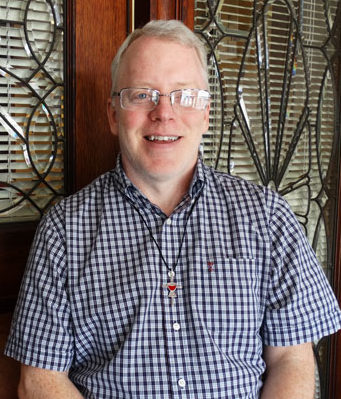The heart itself is but a small vessel, yet there are dragons and there are lions; there are poisonous beasts and all the treasures of evil. And there are rough and uneven roads; there are precipices. But there is also God, also the angels, the life and the kingdom, the light and the apostles, the treasures of grace—there are all things. – Pseudo-Macarius, 5th Century
By Brother Matt Schaefer, C.PP.S.
Some years ago, I was going through some spiritual struggles. I had recently completed my formation with the Missionaries of the Precious Blood, and I was trying to figure out how I would live in the world as a Missionary brother. I’d made a commitment to God and to my fellow Missionaries; but how did God want me to live out that commitment? What was I supposed to do about the internal struggle between selfish desires and selfless service? Between my own will and God’s will?
Fortunately, I had a very good spiritual director who helped me sort out my thoughts. She gave me a reading that included the above quote from an unknown homilist. The author offers a wonderful picture of the contradictions residing in the human heart: the capacity to do wrong or do right, the presence of both darkness and the light of God, treacherous beasts and guiding angels. With all that going on, it is no wonder that discerning the will of God can be challenging.
In today’s Gospel, Jesus has a hard lesson for the disciples about God’s will, both for Jesus and for them. Jesus tells them that he will suffer, be killed, and be raised. Peter cannot accept this. The Messiah was expected to be a victorious warrior who would conquer their enemies and lead an earthly kingdom for God’s chosen people. Such a Messiah could not suffer and die. Perhaps Peter was hoping that the loyal disciples would also be spared suffering. Jesus rebukes Peter, “Get behind me, Satan.” This seems harsh, but it highlights the ever-present temptations that interfere with our discernment of God’s will. And Jesus doesn’t say, “Go away, Satan!” No, he instructs Peter to get behind him—in other words, to follow him.
Jesus then instructs his disciples to deny themselves, take up their crosses, and follow him. Denying oneself is not about putting yourself down or erasing your unique identity; it is about respecting yourself as a child of God. To follow Jesus fully, we must avoid selfish desires and worldly temptations so that our lives will be ordered to the will of God. Taking up our crosses isn’t just about accepting the trials and annoyances of life; it means embracing everything that comes with a life devoted to Jesus. Remember that the cross was not just a means of death; it was a shameful and horrific punishment. But we know also the glorious message of the cross—that it is the source of our redemption. Those who are willing to pay the price will be vindicated.
Poor Peter’s heart, like my own, surely had its beasts, temptations, and rocky roads; but in the end he listened to the good things that resided there. He let the angels and the grace of God guide him in his journey to follow Jesus. The will of God is discerned through Scripture, through the teachings and sacraments of the Church, and through prayer. Indeed, the will of God is already present in our hearts; we just have to find it amidst all the distractions. Taking Peter and the disciples as models, may we always be committed to discerning God’s will and following him with joyful, undivided hearts.
![]()

Brother Matthew Schaefer, C.PP.S., is in ministry at the St. Gaspar Family of Parishes in Dayton.
